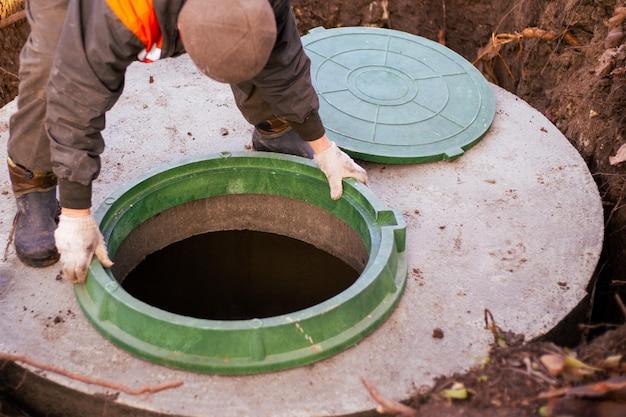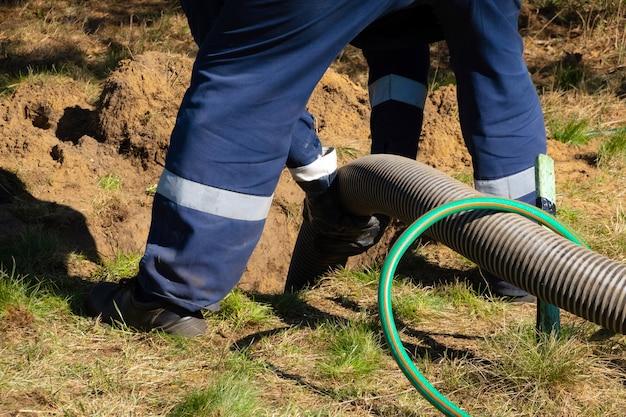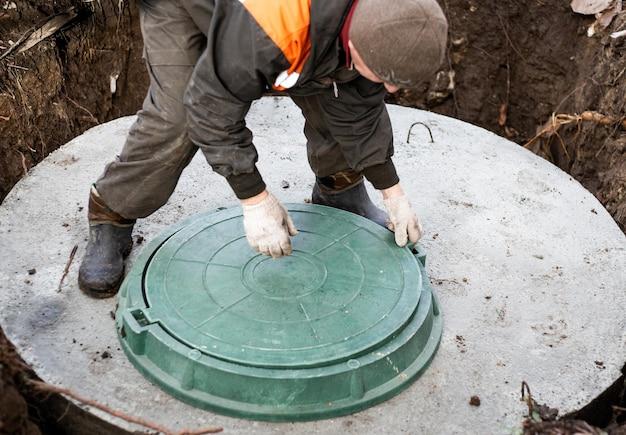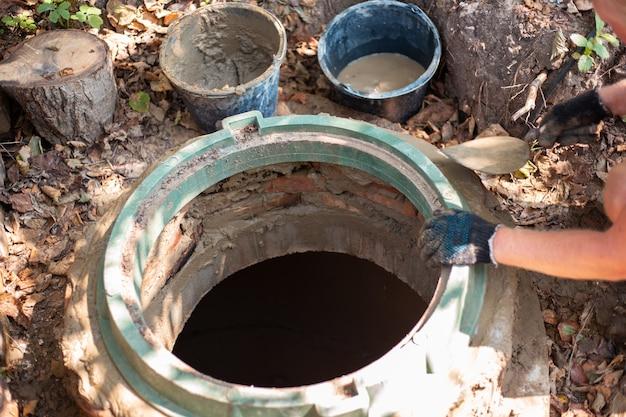Are you considering selling your house, but your septic system has failed inspection? Don’t panic just yet! Selling a house with a failed septic may not be as daunting as it seems. In this blog post, we will explore the ins and outs of selling a house with a failed septic system, the legal implications, and what you can do to mitigate the situation.
Before we delve into the details, let’s address the most burning question: Can you actually sell a house with a failed septic system? The answer is not a simple yes or no. Each state and local jurisdiction may have specific regulations and requirements when it comes to selling a house with a faulty septic system. So, it’s important to understand the laws and regulations in your area.
One potential course of action is to enter into a septic escrow agreement. This agreement allows you, as the seller, to sell the house while putting funds into an escrow account to address the septic system issues. The buyer then has the responsibility to fix or replace the septic system after the purchase is complete.
But what if the septic system is not permitted for repair or replacement? This can be a tricky situation. In some cases, there may be penalties for illegal septic systems, and selling a house with such a system may not be possible without addressing the issue.
Another concern arises when the seller fails to disclose the condition of the septic tank. This can lead to legal repercussions, as sellers are typically obligated to provide accurate and truthful information about the property. Failing to disclose a failed septic system can result in legal disputes and financial liabilities.
So, you might wonder, why would anyone buy a house with a failed septic system? Well, buyers might be enticed by the potential for a lower purchase price and the opportunity to make necessary repairs or replacements themselves. Additionally, some buyers might already have plans to connect the property to a public sewer system.
In the coming sections, we will dive deeper into the considerations and steps you can take when selling a house with a failed septic system. Whether you’re in Massachusetts, Connecticut, or any other state, we will provide you with valuable insights to navigate this challenging situation. So, let’s get started and explore your options when it comes to selling a house with a failed septic system!
Can You Sell a House with a Failed Septic
So, you’re thinking of selling your house, but there’s just one little problem: the septic system has failed. Now, you might be wondering if this is a deal-breaker. Can you still sell your house with a failed septic? Well, the answer is not as straightforward as you might think. Let’s dive into the nitty-gritty details and find out what you can do in this situation.
Understanding the Impact of a Failed Septic
A failed septic system can definitely put a damper on the sale of your house. After all, no potential buyer wants to deal with sewage backups or costly repairs right after moving in. So, it’s important to understand the implications of a failed septic system when putting your house on the market.
Evaluating the Severity of the Problem
The first step is to assess the severity of the septic system failure. Is it a minor issue that can be easily fixed, or is it a major problem that requires a complete overhaul? This will determine the options available to you and the potential impact on your home’s value.
Making Repairs and Disclosing the Issue
If the septic problem is fixable, your best bet is to get it repaired before listing your house. Not only will this make your home more appealing to buyers, but it will also save you headaches down the line. Be sure to keep all invoices and documentation to prove that repairs have been made.
Providing Full Disclosure to Potential Buyers
Transparency is key when selling a house with a failed septic system. In most cases, you’ll be required to disclose any known issues with the septic system to potential buyers. This might seem like a deal-breaker for some, but others might be willing to take on the challenge if the price is right.
Adjusting the Asking Price
Of course, selling a house with a failed septic system will likely have an impact on its value. You might need to adjust your asking price to reflect the cost of repairs or the potential inconvenience for the buyer. Remember, finding the right buyer who sees the potential in your home is key.
Exploring Alternative Options
If all else fails, and you’re unable to sell your house with a failed septic system, you might consider alternative options. This could include offering seller financing, looking for cash buyers, or exploring lease options. It’s important to consult with a real estate professional to explore all available avenues.
Wrapping Up
In conclusion, selling a house with a failed septic system is not an ideal situation, but it’s not necessarily a deal-breaker either. By assessing the severity of the problem, making necessary repairs, disclosing the issue, adjusting the price, and exploring alternative options, you can increase your chances of finding the right buyer. Remember, honesty and transparency are key throughout the process. Good luck with your house sale!
Septic Escrow Agreement
When it comes to selling a house with a failed septic system, both the buyer and the seller may find themselves in a sticky situation. One of the solutions that can help both parties navigate this issue is a septic escrow agreement. So, what exactly is a septic escrow agreement? Let’s dive in and find out.
What is a Septic Escrow Agreement
A septic escrow agreement is a legal contract that outlines the terms and conditions between the buyer and the seller when a house is being sold with a failed septic system. This agreement allows the sale to proceed while addressing the necessary repairs or replacement of the septic system after the closing of the sale.
How Does it Work
Typically, a septic escrow agreement involves the buyer placing a certain amount of money into an escrow account. This money acts as a security deposit to cover the costs associated with repairing or replacing the failed septic system. The specific amount is determined through negotiations between the buyer and the seller.
The Importance of a Septic Escrow Agreement
A septic escrow agreement is important for both the buyer and the seller as it provides protection and clarity regarding the responsibilities and expectations related to the failed septic system. It helps avoid misunderstandings and potential legal issues, ensuring a smoother closing process.
Benefits for the Buyer
For the buyer, a septic escrow agreement provides a safety net. Instead of having to assume the full financial burden of fixing the septic system immediately after purchasing the house, the buyer can contribute a predetermined amount into the escrow account. This allows them time to assess the extent of the necessary repairs and plan their budget accordingly.
Benefits for the Seller
On the other hand, a septic escrow agreement benefits the seller by allowing the sale to proceed despite the failed septic system. It increases the chances of finding a buyer who is willing to take on the responsibility of repairing or replacing the system, as they know it will be addressed after the sale is finalized.
Complete Peace of Mind
By utilizing a septic escrow agreement, both the buyer and the seller can have peace of mind. The agreement ensures that the necessary repairs or replacements to the septic system will be taken care of in a fair and timely manner, without jeopardizing the overall sale of the house.
When faced with the challenge of selling a house with a failed septic system, a septic escrow agreement can be a valuable tool. It provides a framework for addressing the issue while allowing the sale to progress smoothly. So, if you find yourself in this situation, consider discussing a septic escrow agreement with your real estate agent or legal advisor to protect your interests and ensure a successful transaction.
Septic Failed Inspection: Now What
So, your septic system failed the inspection. Bummer, right? But don’t panic just yet! There are still options and solutions available to you. In this section, we’ll explore what you can do when faced with a failed septic inspection.
Understanding the Problem
First things first, take a moment to understand why your septic system failed the inspection. It could be due to a variety of reasons, such as a clogged drainfield, overflowing tanks, or structural issues. Getting to the root cause will help you strategize your next move.
Assessing the Severity
Not every failed inspection means your septic system is a total disaster. It could be a simple fix or a minor issue that needs attention. Before jumping to conclusions, consult with a professional septic inspector to determine the severity of the problem.
Seeking Professional Advice
Now that you have a better understanding of the problem, it’s time to seek advice from the experts. Reach out to septic repair specialists or plumbing professionals who can provide guidance on the necessary steps to take. They will assess the situation and offer solutions tailored to your specific needs.
Repair or Replacement
Based on the severity of the septic system’s failure, you’ll need to decide whether to repair or replace it. In some cases, a few repairs or upgrades may be all that’s needed to get your septic system back on track. However, if the issues are extensive and the costs of repairs outweigh the benefits, replacing the system might be the smarter long-term investment.
Budgeting for the Solution
Everyone’s favorite topic – money! Sadly, fixing a failed septic system doesn’t always come cheap. Consult multiple professionals to get cost estimates for repairs or replacement. This will help you create a realistic budget for the solution.
Financing Options
If you’re worried about the financial strain, explore financing options available to you. Some local governments, banks, or organizations offer loans or grants specifically for septic system repairs. Research and apply early, as these options may take time to process.
Acting Promptly
Regardless of the route you choose, acting promptly is crucial. A failed septic inspection can have environmental and health implications, so it’s essential to address the problem as soon as possible. Don’t procrastinate, or you could end up regretting it later.
Okay, so the septic system inspection might not have gone as planned, but don’t let that bring you down. With the right approach and knowledgeable professionals by your side, you can overcome this obstacle. Remember, it’s just a temporary setback in the grand scheme of things. Stay positive, take action, and get your septic system back on track!
Now that we’ve discussed what to do when faced with a failed septic inspection, let’s move on to the next exciting subtopic: Selling a House with a Failed Septic.
Penalty for an Illegal Septic System
An illegal septic system can lead to serious consequences for homeowners. From hefty fines to potential legal issues, the penalties for having an unpermitted or failed septic system can quickly drain your wallet and cause significant stress. In this section, we will explore the potential penalties you may face if you attempt to sell a house with a failed septic system.
Understanding the Legal Ramifications
When it comes to septic systems, proper installation, maintenance, and compliance with local regulations are paramount. Using an illegal septic system, whether knowingly or unknowingly, can result in severe penalties. It’s crucial to understand the legal ramifications and take appropriate action before putting your home on the market.
Financial Consequences
Selling a house with a failed septic system, especially if it’s illegal, can have a significant impact on your finances. Depending on your location and the specific regulations in place, you may face steep fines from local authorities. These fines can range from hundreds to thousands of dollars, which can greatly diminish your potential profits from the sale.
Legal Challenges
An illegal septic system can also lead to legal challenges. Potential buyers may uncover the issue during the inspection process, and this can lead to negotiations or even the termination of the sale. If you fail to disclose the failed septic system, you could face legal action from the buyers. It’s essential to be transparent and upfront about any septic system issues to avoid encountering legal trouble.
Impact on Property Value
A failed septic system, even if it’s illegal, can significantly impact the value of your property. Prospective buyers are likely to be deterred by the potential problems associated with an illegal or failing septic system. This can make it more challenging to sell your property and may result in a lower selling price.
Environmental Consequences
Aside from the financial and legal repercussions, an illegal septic system can also have detrimental effects on the environment. Improperly treated wastewater can pollute nearby groundwater and nearby bodies of water, causing harm to aquatic life and potentially affecting public health. It’s essential to address septic system issues promptly to minimize any negative environmental impact.
While it may be tempting to attempt to sell a house with a failed septic system, it’s important to understand the potential penalties. From financial consequences to legal challenges and environmental harm, the overall impact can be substantial. To protect your interests and avoid unnecessary stress, it’s best to address any septic system issues before putting your property on the market.
Buying a House with a Failed Septic System
Have you ever considered buying a house with a not-so-great septic system? Well, you’re not alone! Many people find themselves in a predicament where a dream house comes with a failed septic system. While it may sound like a nightmare, there are actually a few things to consider before completely writing off the idea. So, grab a cup of coffee and let’s dive into the world of buying a house with a failed septic system!
Evaluating the Situation
Before making any decisions, it’s crucial to thoroughly evaluate the situation. Start by getting a professional inspection done to determine the extent of the septic system failure. This will give you a clearer picture of the potential costs and repairs needed. Remember, this inspection is your best friend and can save you from major headaches down the road.
Negotiating the Price
Alright, so you’ve found a house you love, but it comes with a less than stellar septic system. Don’t fret just yet! This is the perfect opportunity to negotiate the price. Use the information from the inspection to your advantage and discuss the repairs and associated costs with the seller. You may be able to reduce the price to accommodate the necessary repairs.
The Benefits of Buying a House with a Failed Septic System
Believe it or not, there are actually a few benefits to buying a house with a failed septic system. First and foremost, it allows you to purchase a property at a potentially reduced price. Additionally, you have the chance to customize and upgrade the septic system to your preferences. It’s like starting with a blank canvas and creating your own masterpiece!
Weighing the Costs
Of course, with any decision, there are also costs to consider. Repairing or replacing a septic system can be pricey, so it’s essential to factor these costs into your budget. Remember, it’s not just the initial repair that you need to consider, but also ongoing maintenance and potential future issues that may arise.
Seeking Professional Advice
If you’re unsure about whether buying a house with a failed septic system is the right move for you, it’s always a good idea to seek professional advice. Consult a real estate agent or a septic system expert who can guide you through the process. They can provide invaluable insight and help you make an informed decision.
Wrapping Up
Buying a house with a failed septic system may seem like a daunting task, but with careful evaluation and consideration, it can turn into a rewarding investment. Just remember to thoroughly assess the situation, negotiate the price, and weigh the costs before making your final decision. And who knows, you might just end up with your dream home, complete with a brand new septic system tailored to your liking!
Can You Sell a House with a Failed Septic in Massachusetts
The Big Question: Can You Sell a House with a Failed Septic in Massachusetts
If you find yourself in the tricky situation of trying to sell a house in Massachusetts with a failed septic system, you’re probably wondering if it’s even possible. After all, the septic system plays a crucial role in the functioning of a house, so it’s no surprise that potential buyers might have concerns. Well, fear not! We’re here to shed some light on this topic and help you navigate through it with ease.
Understanding the Failed Septic Conundrum
First things first, let’s discuss what a failed septic system means. In Massachusetts, a failed septic system refers to a system that does not effectively treat and dispose of wastewater. This could be due to various issues such as blockages, leaks, or a system that is simply too old and outdated. When a septic system fails, it can result in unpleasant odors, sewage backups, and potential health hazards.
Disclosing the Failed Septic Situation
When selling a house with a failed septic system in Massachusetts, it’s crucial to be transparent and disclose this information to potential buyers. Massachusetts law requires sellers to disclose any known defects or issues with the property, including problems with the septic system. Failing to disclose this information can lead to legal troubles down the line, so it’s best to be upfront and honest from the start.
The Buyer’s Perspective
While selling a house with a failed septic system may seem like an uphill battle, there’s still hope. Some buyers might be open to purchasing a house with a failed septic system, especially if the price reflects the necessary repairs and updates. However, it’s important to note that not all buyers will be willing to take on this responsibility.
Assessing the Market
Before putting your house on the market, it’s wise to assess the current real estate market in Massachusetts. Research recent sales of houses with failed septic systems in your area to get an idea of how these properties are valued. This market research will provide valuable insights and help you set a realistic asking price for your house.
Exploring Financing Options
One potential hurdle when selling a house with a failed septic system is financing. Many traditional lenders may be reluctant to provide loans for houses with such issues. However, alternative financing options such as rehab loans or cash buyers who specialize in buying properties in need of repair might be more open to purchasing your house.
The Importance of Professional Guidance
Navigating the process of selling a house with a failed septic system can be complex. That’s why it’s essential to seek guidance from professionals who specialize in real estate transactions and septic system repairs. They can help you understand the steps involved, evaluate the potential costs, and provide expert advice tailored to your situation.
In summary, while it may not be a walk in the park, it is indeed possible to sell a house with a failed septic system in Massachusetts. By being transparent about the issue, understanding the buyer’s perspective, assessing the market, exploring financing options, and seeking professional guidance, you increase your chances of finding the right buyer who is willing to take on the challenge. Remember, honesty, patience, and a positive attitude can go a long way in navigating this unique situation.
Do I Need to Pump My Septic Tank Before I Sell My House in CT
When it comes to selling a house in Connecticut, there are many factors to consider, one of which is the condition of your septic tank. You may be wondering, “Do I need to pump my septic tank before I sell my house in CT?” Well, let’s dive into this smelly topic and find out!
The Importance of a Well-Maintained Septic Tank
Having a properly functioning septic tank is essential for any homeowner. Not only does it ensure the efficient disposal of wastewater, but it also helps maintain a healthy environment and prevents potential issues that could arise if the septic system fails. So, before putting your house on the market, it’s crucial to assess the condition of your septic tank and take appropriate action if needed.
Avoid Surprise Inspections
When selling a house in CT, it’s common for buyers to request a septic inspection as part of the process. Failure to address any septic tank issues can lead to unwelcome surprises during the inspection, potentially causing delays or even scaring away potential buyers. Therefore, it’s better to be proactive and take care of any necessary septic tank maintenance beforehand.
Pumping Your Septic Tank: To Do or Not to Do
The necessity of pumping your septic tank before selling your house in CT depends on a few factors. Firstly, it’s recommended to have your septic tank inspected by a professional to determine its current condition. If the inspection reveals that the tank is nearing its capacity or showing signs of failure, it may be wise to pump the tank to alleviate any potential issues.
Better Safe Than Sorry
While it may be tempting to skip the septic tank pumping to save time and money, it’s important to consider the long-term consequences. A failed septic system can lead to foul odors, sewage backups, and extensive repairs, which can be costly and time-consuming. By taking care of your septic tank before selling, you’ll provide prospective buyers with peace of mind and avoid any unpleasant surprises down the road.
In conclusion, if you’re planning to sell your house in CT and have a septic system, it’s advisable to have your septic tank inspected to determine its condition. Pumping your septic tank before selling can prevent potential issues, ensure a smoother transaction, and impress potential buyers with your attention to detail. Remember, a well-maintained septic system is not only good for your home but also for the environment and your future buyers. So, take care of your septic tank, and happy selling!



